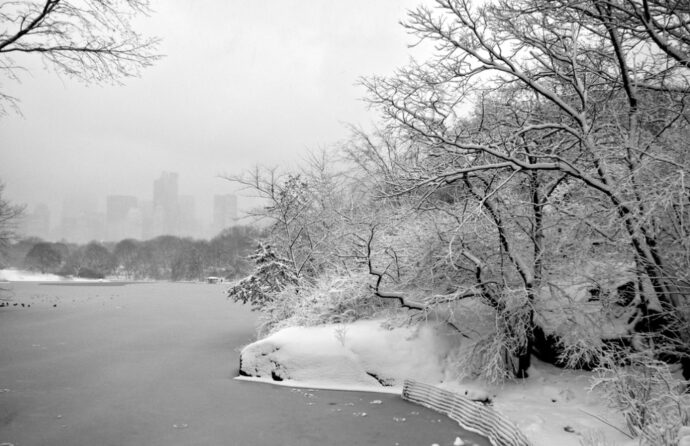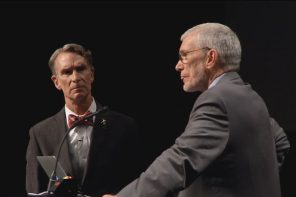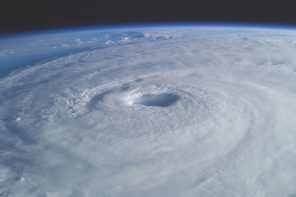Psalms of lament are being sent heavenward this winter. Like a kid, I’m hoping for a snow day today. The forecasters have gone apocalyptic again with inches of white fluff expected overnight. I wake at dawn and pull back the curtain, but not a flake has fallen.
This winter has been like that. The south digs out from yet another snowstorm. Boston has drifts that could bury a yeti. The blizzard of the century last month may have missed us New Yorkers by an order of two or three states, but it has been very cold—and those of us in the commuting crowd have learned new applications for the word “endurance.”
It was only a matter of time before the remark would be heard. Perhaps you know the one I mean. An anonymous guy sitting on the bus, as it turns out, this time. “They say there’s global warming. It sure doesn’t feel warmer to me.” Every year I hear this quip and every year I wish that science didn’t have to contend with politics in what is really, at heart, an ethical conflict.
Scientists are not good at naming things. Consider that most fossils bear Latinate names that the average tongue can’t tackle. Who knows how to tell an up quark from a down quark? I still think a Quasar is a refrigerator. “Global warming,” while as much a fact as evolution, is nevertheless a technically correct term. The world is warming up and everyone but the petroleum and coal industries understand that it’s because of human activity.
The world, however, is an awfully big place. We have trouble seeing the entire picture. So now we’re calling it “climate change” instead. For better or for worse?
Since Quasar refrigerators have already come up, perhaps it’s no surprise that Jurassic Park feels contemporary to me. The scene where Dr. Ian Malcolm explains chaos as a butterfly flapping its wings in Peking and causing rain in Central Park. That’s global warming. Just because it’s colder here doesn’t mean the whole place isn’t heading toward Hell. The data don’t lie, and that’s the course we’ve charted.
Why doesn’t the alarm stay high on global warming (excuse me, climate change)? Read a book about the state of the environment, this one perhaps. If my experience is anything like normative, your blood pressure will go up. When you put the book down you’ll be as zealous as a martyr in first-century Rome. Something must be done!
But by the time I step off the bus my mind will be back to something the boss said yesterday. Or the fact that I’ve got to take the car in for an oil change. Or that taxes are going to be due soon. And the world warms.
Global warming is already changing our lives. The science of climatology seconds the fictional Dr. Malcolm’s observation about chaos—everything affects everything else. The earth’s atmosphere is so complex that overeducated scientists still get the weather forecast wrong. For somebody who can’t even balance his checkbook, the math looks worse than its effects. The atmosphere, where traditional Judeo-Christian outlooks places God’s dwelling, is every bit as chaotic as Leviathan. We can’t control it. We don’t even understand it. Yet we boldly pollute it.
It looks like it won’t be a snow day after all.
So why doesn’t the alarm last? Perhaps it’s because global thinking is difficult. Our daily lives are filled with local pressures—it’s hard enough to get by just here, just now. In the back of my mind I know that the rest of the world is out there, and that by participating in the only lifestyle I know I’m contributing to the problem. It’s a long commute to New York City, but even on a bus I contribute as the plate is passed every day. Carbon emissions get me to work, along with thousands and thousands of others. It’s a chaotic system.
For businesses tied to the weather-closing status of the New York City Public Schools, there’s yet another ethical element. During one of New York’s worst storms—last year—Mayor de Blasio kept the schools open in horrendous travel conditions. One of the reasons given? Many children get their only hot meal of the day at school. We have to force kids to school so they can eat a square meal? And Zuccotti Park was cleared out years ago. A city like New York, with both ostentatious wealth and profound inequality, is part of a chaotic system. Are we using our schools to educate or to shelter our privilege?
And I thought the atmosphere was chaotic.
Change is possible. We are now, slowly, wising up to the evils of social prejudice. We are even more globally aware in that respect. My wish for a snow day is only local. But a snow day here is connected to warmer polar temperatures that affect everyone. Why don’t I think of the rest of the world when I’m dressing like an Inuit to wait for the bus?
I need to turn my eyes to the sky. The world is the one thing we all share and the atmosphere covers us all. Unless we can sustain our concern over global warming, snow days will become mere memories of a more temperate past.
For now I have to get to work.
Photo of NYC blizzard by flickr user Sarah_Ackerman via Creative Commons.





